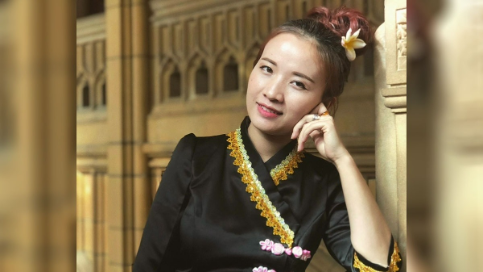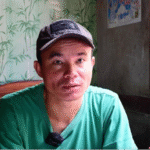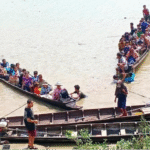An interview with Nan San Nwe, a member of the Shan ethnic group who is the first and only woman from Myanmar selected as a William P. Fuller Fellow in Peacebuilding
Nan San New has consistently worked with international organizations on peace and conflict processes. Currently, she is a researcher focused on peace and conflict.
In this interview with Shan Herald, she talks about why she was selected for the fellowship, and her views as an ethnic minority youth on the 70 plus years of armed revolution and the peacebuilding process in Myanmar.
Q: Can you please tell us about how and why you were selected as a 2023 William P. Fuller Fellow in Peacebuilding by US-based Asia Foundation?
A: Yes, the name of this program is William P. Fuller Fellows in Peace Building/Conflict Resolution. It is awarded by the Asia Foundation based in the US. This time they selected three people – one from Myanmar, and two others from Sri Lanka and Afghanistan. Out of the three selectees, I was the only one from Myanmar. I am honored and delighted by this because there were more than 100 applicants. There are two parts to this – first, why I applied, and second, why they selected me.
To explain the first part, the reason I applied for this program is that its name is Peace Building/Conflict Resolution. This is a subject I am very interested in. The reason is that I am currently writing a research paper on Conflict Transformation for an organization. I am very interested in this area, and have studied it more deeply over the past couple of years. I also completed my master’s degree in Peace and Conflict Studies. In the past, I have worked with some international organizations and development or health organizations on conflict-sensitivity in development work, especially in the northern Shan State area along the ethnic conflict areas.
As I am personally interested, I applied for this program. Especially for networking and capacity building. I am currently working on Conflict Transformation, so to improve my capabilities in these areas, The Asia Foundation also does a lot of work related to conflict. They have a lot of resources on this, so I also wanted to connect with those resources.
Also, this program provides an opportunity to network young people who are deeply involved in peace building. I applied for it because what I want to do and what I am doing share the same path. The purpose of this program is to support the emerging generation of youth leaders working on peacebuilding in the Asia region, by supporting young and middle-aged leaders in their professional development.
With Myanmar’s long history of conflict and the resurgence of armed conflict following the 2021 coup, it fits their criteria as a country in the Asia Region. Also, the Asia Foundation had not selected anyone from Myanmar since 2014. So I think they wanted to support someone from Myanmar this year to help and support Myanmar.
Q: So you can say that you are the first and only woman from Myanmar to be selected as a William P. Fuller Fellow, right?
A: Yes, that’s right. You can say that.
Q: Q: What programs do you have to complete after being selected?
A: There are three parts to the program. There is a 12-day study tour to the US. Then I’ll go to The Asia Foundation headquarters in San Francisco for 2-3 days. There are also programs with peace and conflict resolution organizations in Washington DC. And then I have to go to New York as well. Even before going there, right now I’m attending online conferences. There are three conference programs. In the conference I’m attending now, I can discuss with experts from the foundation, and ask about things I want to know.
Another thing is sharing experiences between Fellows. The third is they will provide a $5000 grant. I can use that for areas I’m interested in – to do a project, attend a training, things like that. So that’s the program. For now I’m attending online conferences. Next month I’ll go in person.
Q: During the 12-day US tour, you also get to discuss in person about peace – so what do you plan to discuss about the Shan State, Myanmar, in terms of peace? What will be the main topics of discussion?
A: The main thing is to study, as per the aim of this program. Especially about how conflict transformation is addressed in other countries. The other two Fellows are also experienced people, so we’ll discuss the challenges they face. And I’ll present about the situation here and have an exchange. That’s what I’m thinking so far. I’m also discussing in the current conference.
When I go in person, I’ll also get to meet practitioner experts, and institutions working on peace and conflict resolution – so in that setting, I plan to discuss about the Myanmar and Shan State issues, exchange perspectives, and also request advice from them. Since there are only three Fellows, there is a lot of time, a lot of opportunity to exchange. Another thing is I plan to advocate and request.
What I mean is, Asia Foundation has assisted and supported conflict and peace issues from before – so I plan to request they become more involved, and support more effectively, and so on. I also plan to advocate for a bottom-up approach – one that includes women’s organizations, civil society organizations, and so on.
Q: Given the complex political situation in Myanmar, what needs to be done to advance the peace process? What do you think about the focus on militarization rather than peacebuilding after the military coup?
A: In truth, when we talk about peace, we don’t just mean ceasefires – the peace we talk about means there is justice. And at minimum levels of violence – physical, mental, discriminatory attitudes. In Myanmar, when we say ceasefire, what comes to mind is the handshake meetings and ceasefires between leaders. If I have to explain it in the sense I understand – it’d even be wrong to call these peace.
And why? Because the approach is wrong. The main problem in Myanmar is not resolving core issues. They just ended up with a compromise. It just ends with leaders discussing. It’s not an all-inclusive discussion either. And the problem of chauvinism is not recognized. Plus there are the problems of extreme nationalism and militarism. We need to change these. And the approach of an all-inclusive genuine peace process needs to change from the start. This is how I see it.
Q: As a young woman, why are you particularly interested in this peace issue?
A: There are two parts. First, as I mentioned earlier, it has to do with my own interests and experiences. And as an ethnic Shan woman, if I look at my parents and grandparents’ experiences, they suffered from this conflict. And in our country, these conflicts have been continuously cycling for over 70 years without ending, so from my position I want to contribute somehow. Second is that I’m interested in this field of peace and conflict studies, so I went to study it, and worked on being conflict-sensitive with international organizations.
And when reading conflict analyses, I noticed many were by foreigners. And if you look at analyses on the Shan State conflict, many are not by Shan locals, but are Bamar or foreigners. Most are foreigners. What I want to say is – those analyzing the situation and conflicts in my Shan State are not ourselves. I see others analyzing our issues. So I want to be the one analyzing our own issues, the one who best understands.
I see that some of the analysis is very good. But I feel some needs still exist. So as myself, I want to be the expert on our issues. Especially as there are few women experts in this peace and conflict field, as an ethnic minority woman I want to be the one finding solutions for our issues. Based on these thoughts, I became interested in this area, and got involved.
Q: What would you like to say to the new generation of youth regarding peacebuilding?
A: One thing for youth is that peaceful circumstances mean a just and free society. The generation of youth wants more freedom. And in this Spring Revolution, we’ve also seen youth actively leading on the front lines. And as for the future, it concerns us young people more than the older generation now.
So what I’d like to urge the youth is: You must participate yourselves in building a peaceful society. And as young people, you must resist the dictators’ oppression of the people. Speak of federalism, politics – know for yourselves what you want. You must also actively participate yourselves. As young people, you must improve your own skills. Only then can you achieve the peaceful, free future you want. I want to tell them to strive to participate in transforming society.
Q: As an ethnic youth, how do you view Myanmar’s 70 plus years of armed revolution and the peace process, and what kind of future do you want for Shan State?
A: Some say if the problem of Shan State can be resolved, it can resolve half of the conflicts and crises happening in Myanmar. If you compare the Shan State situation with the whole Myanmar – it’s quite significant in terms of population or economy. And in terms of armed forces, most of them based in Shan State. Other problems like drugs are also most prevalent in Shan State.
It also borders Thailand and China, so it’s a strategic area economically. During the Thein Sein’s government, and Daw Aung San Suu Kyi’s government, there were peace processes but fighting continued. The situation still complicated now. So in my opinion, we need to handle it wisely. Compared to other states, Shan State has the most diverse mix of ethnic groups and organizations that can accept each other, so I think we’ll make more progress if we build on the principle of unity in diversity.
Sent by Shan Herald.



